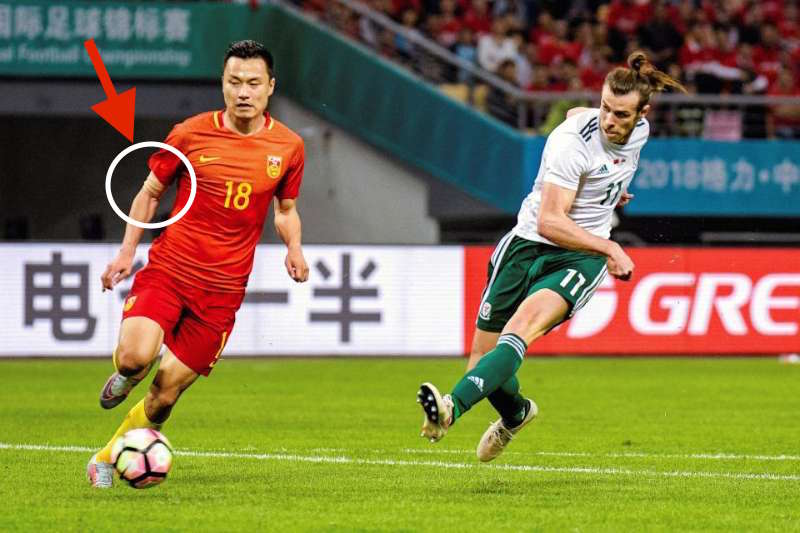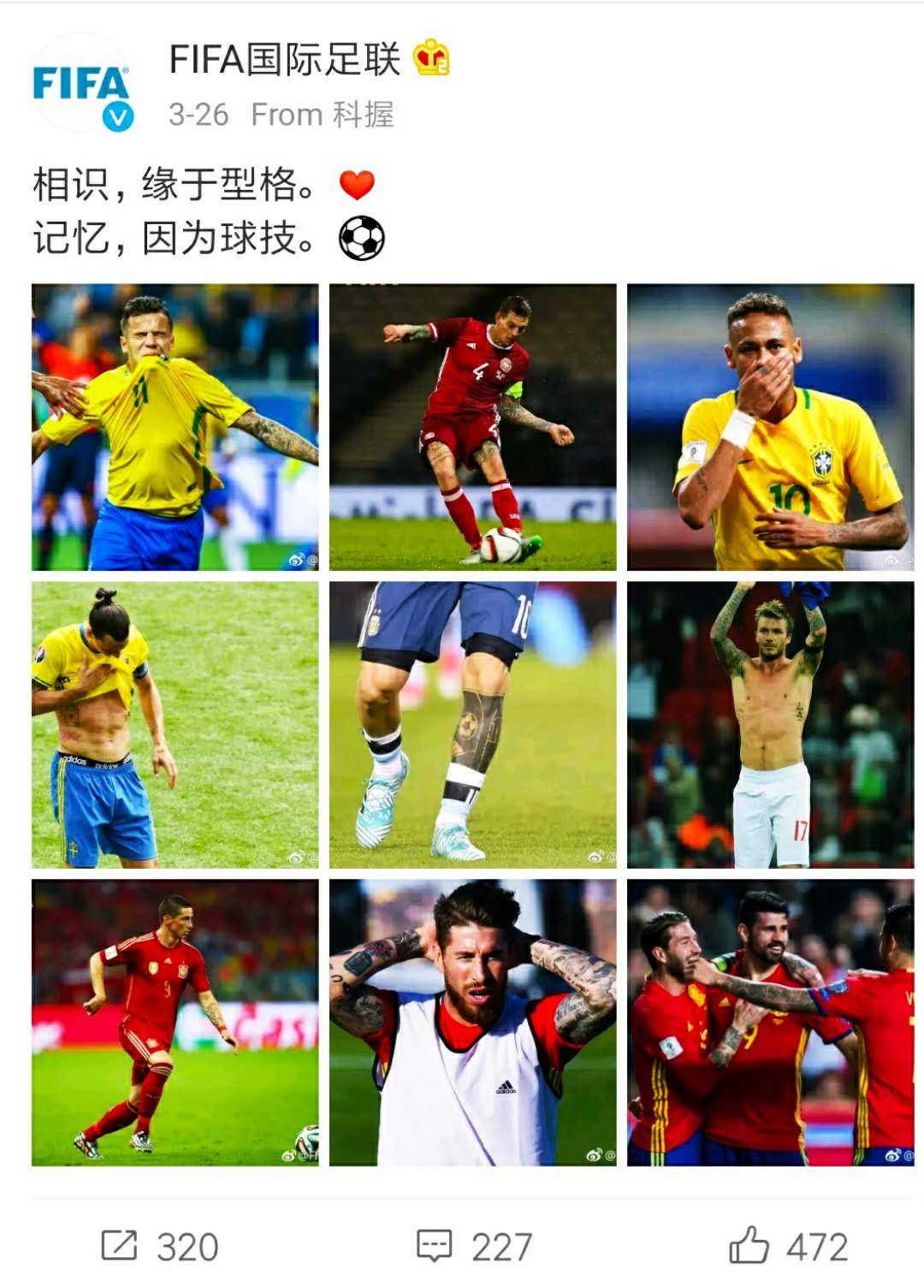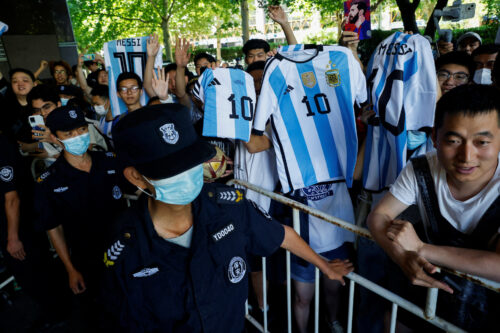Tattoo ban latest humiliation for China’s beleaguered soccer team

The China Sports Column is a The China Project weekly feature in which China Sports Insider Mark Dreyer looks at the week that was in the China sports world.
If only Chinese footballers could shoot the ball in the net as consistently as Chinese football shoots itself in the foot.
Shortly after last week’s column about China’s 6-0 hammering by Wales in the China Cup went to print, soccer fans started to notice something in photographs of the match that hadn’t been immediately obvious on TV.
Why were certain Chinese players wearing skin-colored bandages on their arms? Was this some kind of newfangled wearable tech? Was a highly contagious skin rash spreading through the locker room?
The truth was far more simple, but even in the mercurial world of Chinese football, it was scarcely believable: the players had been told to hide any visible tattoos.
Additional information has been creeping out over the past week. While the Chinese Football Association (CFA) has yet to issue any public ruling, Sohu said it was done in the name of “healthy cultural education.” One CFA representative denied a report that the apparent ban was set to spread nationwide.
What’s clear is that — yet again — the CFA has been blindsided from above and told to hastily enforce a rule based on the whim of someone with enough power to be obeyed. The only question now is how wide the official ban will stretch, with any backlash from fans highly unlikely to make any difference whatsoever.
Two former national team captains have already voiced their approval on this issue. As reported by thepaper.cn, Jia Xiuquan 贾秀全, who now coaches China’s U19 team, last year said, “Any team player who wants to be selected for the next match should wash their tattoos and the color out of their hair. They should focus on the game rather than their image or appearance.”
Meanwhile, Fan Zhiyi 范志毅, who also captained English club Crystal Palace, said, “Why do players have to have tattoos? The priority is to play quality soccer games. Will tattoos make them into better soccer players?”
The obvious response is — if the priority is to play quality soccer games, why on earth does it matter if they have tattoos? Two of Lionel Messi’s four limbs are covered in ink, but he’s somehow managed to overcome that terrible inconvenience to be named the best player in the world on five separate occasions.
He also has a tattoo of his mother on his shoulder blade, with that display of filial piety somewhat contradicting the official line here that all tattoos are part of a hip-hop subculture that corrupts the moral fabric of society.
Report: China to ban tattoos and ‘hip-hop culture’ from TV shows
Messi has also been a central part of the global expansions by both Huawei and Tencent’s WeChat, while dairy giant Mengniu recently signed him to be the face of their World Cup advertising campaign. Are these deals now in doubt? Will billboards featuring David Beckham’s tattooed torso — a central part of his appeal for many — now have to be removed in China?
The further down the path you go, the more ridiculous it becomes, though sadly this is nothing new to Chinese football. The CFA is forced to enact top-down edicts on a fairly regular basis, such as when clubs were told of a reduction in the number of foreigners allowed in their match-day squad in the middle of the transfer window and after several clubs had already filled their international quotas. The CFA usually gets the blame for these badly managed policy changes, but in reality the message is coming from on high, reinforcing just how farcical a claim it is that there is now separation between the CFA and the state — something that world governing body FIFA expressly mandates in its statutes.
There was more than a little irony, then, that FIFA’s newly launched Weibo account pointedly chose this week to highlight several inked players, including Swedish star Zlatan Ibrahimovic, Brazil’s Neymar, and former Liverpool defender Daniel Agger, who is also a qualified tattoo artist rapidly running out of skin for further designs.
FIFA’s social media skills are notoriously lacking, so it’s quite possible that they had an intern running the account, but it’s still interesting to see them take a swipe at government interference — the very thing they have repeatedly failed to stamp out in China.
The most frustrating thing about the whole episode, however, is the attitude it reveals about those in charge. To suggest there is any link whatsoever between tattoos and on-field performance is nonsense. But by curtailing the players’ freedom to express themselves in their personal lives, it would seem natural that this lack of creativity would seep into other areas. It’s reminiscent, in fact, of when China’s current vice president, Wang Qishan, once wondered why Korean-made dramas had become far more popular in China than Chinese-made ones.
The answer seemed clear to almost everyone: censorship. Producers here regularly lament the fact that writers and directors are forced to put all their creative energies into skirting censorship regulations, with little left over for the content itself.
Some Chinese fans I’ve spoken to say they’re OK with a tattoo ban because the players themselves showed such an embarrassing lack of effort in the two China Cup games and so, they argue, more discipline would be no bad thing.
The problem is, discipline or controlling behavior of this type works in gymnastics or diving, where you are repeating the same thing again and again until you win Olympic gold. In soccer, however, the best players are the ones who do the unexpected. You can’t force creativity, but that concept seems particularly hard for some to grasp. Either that or the fear is that different voices inevitably become dissenting voices — all of which leads to the collapse of society.
In practice, then, it’s just another version of the same old story.
Wu Jingui 吴金贵, the manager of Shanghai Shenhua, didn’t seem too enthusiastic about having one more thing to worry about. “We’ll persuade them properly, but tattoos aren’t that easy to wash off. But I can say, from now on, in the education of our young football players, there’ll be a ban, no tattoos,” he said. “Of course, managing tattoos isn’t our main responsibility, the important thing is still raising the quality of our play in competitions and training.”
Other teams, who are already starting from a higher base, are focused on marginal sporting gains — wearing the latest sports fabrics, for example, or perfecting their pre-match diet. Meanwhile, Chinese players are worried about whether their tattoo-covering bandage is the right color or what sort of punishment they might receive if it slips a little during a sliding tackle.
The tattoo ban didn’t make China lose 6-0, but it hardly puts the players in the right frame of mind to perform at their best. And as results have shown again and again, Chinese football needs all the help it can get.
The China Sports Column runs every Friday on The China Project. Follow Mark Dreyer @DreyerChina.







